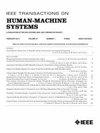动态事件中的辅助决策过程:衡量决策支持系统的影响和人的责任
IF 4.4
3区 计算机科学
Q2 COMPUTER SCIENCE, ARTIFICIAL INTELLIGENCE
引用次数: 0
摘要
决策支持系统(DSSs)越来越多地帮助人类用户在做出决策时考虑他们的输出并将其与独立可用的信息相结合。有些决策事件是动态的,需要在相互依赖的阶段中进行一系列决策。在这些情况下,用户可能无法最优地使用DSS通知,从而可能影响任务性能并阻止DSS实现其目的。我们报告了一个实验,参与者在动态事件中做出决策,观察决策支持系统的输出。他们在很大程度上遵循规范的决策规则,但决策是基于决策支持系统的感知,而不一定是实际的准确性。参与者大多在第一阶段就做出了决定,使用决策支持系统通常会延长做出决定的时间。在设计决策支持系统及相关法规和操作流程时应考虑这些发现,以便人们能够充分利用决策支持系统的潜力。本文章由计算机程序翻译,如有差异,请以英文原文为准。
Aided Decision Processes in Dynamic Events: Measuring Decision Support Systems' Influence and Human Responsibility
Decision support systems (DSSs) increasingly assist human users who should consider their output and combine it with independently available information when making a decision. Some decision-making events are dynamic, requiring a series of decisions in interdependent stages. In them, users may not use DSS advice optimally, possibly compromising task performance and preventing the DSS from fulfilling its purpose. We report an experiment in which participants made decisions in dynamic events, observing the output from a DSS. They largely followed normative decision-making rules, but decisions were based on the DSS's perceived, and not necessarily the actual, accuracy. Participants mostly made up their minds in the first stage, and using the DSS typically lengthened the time to reach a decision. These findings should be considered when designing DSS and related regulations and operational processes so people can utilize the DSS's full potential.
求助全文
通过发布文献求助,成功后即可免费获取论文全文。
去求助
来源期刊

IEEE Transactions on Human-Machine Systems
COMPUTER SCIENCE, ARTIFICIAL INTELLIGENCE-COMPUTER SCIENCE, CYBERNETICS
CiteScore
7.10
自引率
11.10%
发文量
136
期刊介绍:
The scope of the IEEE Transactions on Human-Machine Systems includes the fields of human machine systems. It covers human systems and human organizational interactions including cognitive ergonomics, system test and evaluation, and human information processing concerns in systems and organizations.
 求助内容:
求助内容: 应助结果提醒方式:
应助结果提醒方式:


